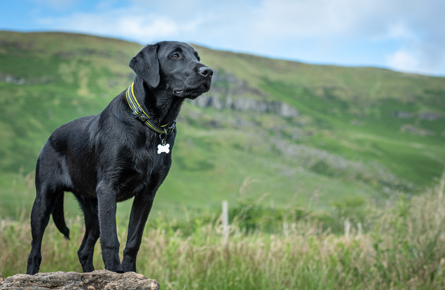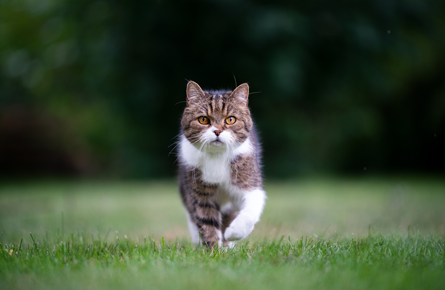Pet Microchipping in Swansea
In the UK, microchipping is now mandatory for all dogs, and owners are required to keep their contact details up to date. While this law only applies to dogs, we also recommend microchipping your cats to improve the chances of being reunited if they go missing.
This rule seeks to decrease the number of stray animals, encourage responsible pet ownership, and speed up the process of finding an owner in case of an emergency. It's equally important to keep your contact information current in the microchipping database since inaccurate information can make it more difficult to return your pet securely.
What Is Microchipping?
Microchipping is a permanent form of identification involving the insertion of a tiny chip, about the size of a grain of rice, under your pet’s skin. This quick and minimally painful procedure ensures your pet has a unique identification number that can be read using a portable scanner.
Most vets, including our clinic here at Gower Vets, as well as local authorities and rescue centers, have access to these scanners. The identification number is linked to your contact details on a central database, making it easy to reunite lost pets with their owners through a simple phone call.
Each microchip contains a unique code assigned to your pet. Once implanted, your pet’s identification and your contact details are registered on the national microchipping database. Keeping your contact details up to date is crucial for successfully reuniting lost pets with their owners.
Book a Microchipping Appointment
Cat, Dog, Rabbit: Which Animals Should Be Microchipped?
Although microchipping is a legal requirement for dogs and puppies (which must be microchipped by eight weeks of age before ownership transfer), it is also highly recommended for cats, rabbits, and other pets.
Be aware that failure to microchip your dog can result in a fine of up to £500. Additionally, pets traveling abroad must be microchipped and have an Animal Health Certificate.
It has now become compulsory for dogs to be microchipped in the UK and their details kept up to date. Although it is only compulsory for dogs to be microchipped in the UK, we recommend that cats be microchipped too. Microchipping your pet may help you to be reunited if they go missing.
Click on the links below to find out more.
Spread the cost of essential healthcare for your pet

To spread the cost of routine and essential healthcare for your pet, we offer our Pet Health for Life plan, which includes microchipping, an annual health check for your pet and more.
Pet Microchipping at Gower Vets
The procedure requires no sedation, as it causes minimal discomfort and can be performed during a routine consultation. If you’re unsure whether your pet already has a microchip, our team can easily scan your pet to confirm.
When microchipping is performed at Gower Vets, you’ll need to complete a registration form, and our team will submit your details to the national database. This registration is valid for your pet’s lifetime, and the cost of the procedure includes the registration fee.
All microchips used at Gower Vets meet International Standards (ISO), ensuring they can be read by scanners abroad for pets traveling under the Pet Passport scheme.
For further details or to schedule an appointment, contact your local Gower Veterinary Clinic. Our friendly team is happy to assist you.
Book a Microchipping Appointment
Why Choose Gower Vets For your Pet Microchipping
Choosing which Vet to go with for your pet microchipping is an important decision to guarantee your pet's safety. At Gower Vets, we take great satisfaction in providing a reliable, competent service that puts your pet's health first. We make the process easy and stress-free for you and your pet with our skilled staff, premium microchips, and all-inclusive assistance. Gower Vets can offer dependable treatment and peace of mind whether you're microchipping a dog, cat, rabbit or getting your pet ready for a travelling.
Here at Gower Vets we aim to provide you with:
- Experienced veterinary staff and friendly customer service
- Comprehensive support throughout your pet microchipping process
- ISO-Compliant microchips to meet international standards
- Microchip checking services so you can double check and avoid duplication issues
- A friendly and reliable service when you contact and visit us here at Gower Vet Swansea
For more information, please speak to one of our friendly team members at one of our practices/practice within by calling the branch most local to your home address.
Microchipping FAQ
What is a Microchip?
A micro-chip is a small implant approximately the size of a grain of rice. Once your pet has been microchipped, the chip sits under the skin and, when scanned, will provide the scanner with a bar code number. THE MICRO-CHIP DOES NOT CONTAIN YOUR PERSONAL INFORMATION.
What Does Pet Microchipping Involve?
Placing a microchip is a simple procedure where the small chip is injected through a needle under your pet’s skin. This can be done by our vets or nurses. A form is completed with your details, your pet’s details and, most importantly, your contact details. This form is submitted to our micro-chip company who register the chip we have implanted with your information. We will also give you copies of your pet’s unique micro-chip number for your records.
Why should I Microchip my pet?
From April 2016 it became a legal requirement that all dogs over 8 weeks old in the UK are microchipped. Most importantly, microchipping identifies your pet as yours. Rescue centres and veterinary surgery's routinely scan stray or injured animals brought in as strays. In many cases these animals are not strays but a much-loved pet and, if micro-chipped, the worried owner can be easily contacted and reunited.
Is Microchipping Permanent?
In the majority of cases, yes. Once the chip has been placed, it will remain under your pet’s skin. It is very common for the chip to move from the original place it is injected. Professionals are aware of this and will check the whole animal with the microchip scanner! Please note that it is possible for a microchip to come out after it has been injected. This is very rare. At Gower Vets in Swansea, if your pet’s microchip can-not be found after we have implanted it we will replace it free of charge.
Can all pets be microchipped?
Most pets can be microchipped including larger birds and tortoises. If you are unsure if your pet can be micro-chipped please call us on
What happens if I move to a new house?
If you move to a new house, you must contact your microchip company to update your contact details. At Gower Vets we can provide you with the number to call as well as updating your details on your veterinary file.








